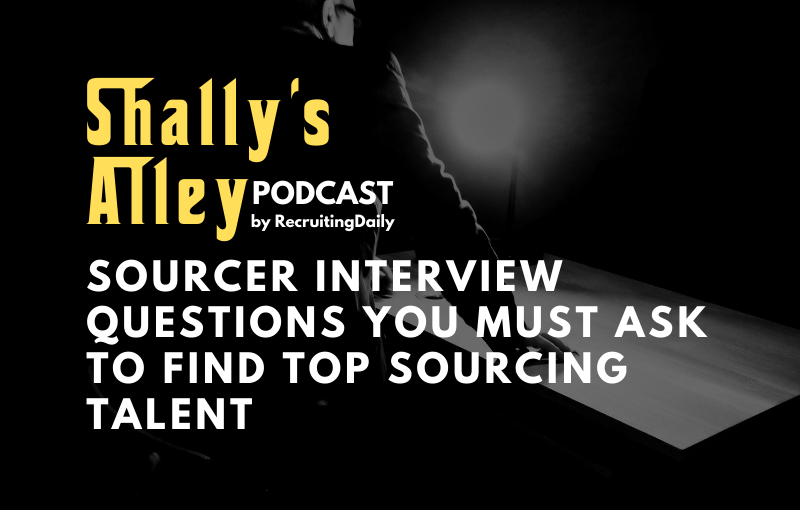This list of interview questions from Shally Steckerl helps assess critical sourcing skills like research, competitive intelligence, creativity, communication, and teamwork.
Situational questions evaluate core competencies like search strategy, organizational skills, and mastering search syntax. Ask about search engines, keyword alternatives, formatting searches, and inbox management.
Behavioral questions reveal problem-solving approaches through real examples. Inquire about projects demonstrating research expertise, utilizing resume databases, leveraging social media, and handling complex searches.
Screen sourcing candidates’ qualifications by combining interviews with assessments like behavioral questions or pre-screening tests.
Explore successes and challenges to understand strengths and growth areas. Ask about experiences showing teamwork, customer service, communication abilities, and times they taught peers.
Discussing both wins and struggles tests autonomy, resilience, and commitment to continuous improvement.
This well-rounded set of sourcer interview questions assesses hard skills and soft skills relevant to the role. Adapt questions to fit your hiring needs.
SITUATIONAL QUESTIONS
- Name three search engines other than Google.
- Besides “resume”, name at least two other words people use to describe that same kind of document.
- Name at least five words you could exclude from a search to eliminate job advertisements.
- What would you do if you don’t know the meaning of a word, jargon, or acronym?
- Using Google describe how you would find resumes of Stanford University alumni who currently work at IBM.
- Detail two different scenarios when it would be necessary to search more than one search engine.
- What strategies do you plan to use in order to keep your inbox organized, clear, and uncluttered?
- What is the difference between information and knowledge?
- In your own words, what is the benefit of “sourcing sets” and “cold calling blocks” (i.e. blocking out time to do just sourcing or cold calling and nothing else, without distractions.)
- Explain the difference between using parenthesis and quotation marks in a search.
- Name at least five places you can go to find alternative keywords to include in your search strings.
- Show the use of three distinct geographical combinations other than zip code that when added to your search strings to limit results by location. (i.e. area codes, city names, etc.)
BEHAVIORAL QUESTIONS
- Please tell me about a time when you conducted deep internet research and Competitive Intelligence activities to bring an especially tough sourcing assignment to a successful outcome? I’d like to understand the nature of the challenge, the specific steps you took to generate this success. In other words, please explain the specific task, the actions you took, and the results you achieved.
- Describe a time when you needed to quickly gather competitor-company data so as to direct-source passive candidates? Again, please explain the specific task, the actions you took, and the results you achieved.
- Tell me about a time when you successfully used robots and spiders to find what you were looking for. Please explain the process to me (task, action, results).
- Please tell me about a time when you put your resume mining skills to good use in sourcing viable candidates. What specific resume bank/s did you utilize? Please explain the search string/s that proved most helpful.
- Describe a sourcing project where social media was especially helpful. What social media avenues proved most helpful/least helpful and why?
- Give me an example of a sourcing project in which you showed exceptional creativity to solve a particular sourcing challenge. Please clarify the task, action, and results.
- Please give me a specific example of a sourcing project in which you were recognized for your exceptional customer service. What makes this particular example stand out in your memory vis-à-vis other projects?
- Describe an example of a specific project in which your communication skills (verbal and written) were really “put to the test”. What the nature of the challenge? Please tell me how you tackled it.
- Please give me an example of a project in which your ability to operate autonomously was put to the test.
- Tell me about an example of a project that you are especially proud of regarding your role as an effective team-player.
- Please tell me a time when you combined behavioral questions and other pre-screening instruments to qualify candidates. I’d appreciate an example or two of the questions themselves as well as your use of additional screening tools to screen candidates. What do you believe was most/least helpful to you?
- Tell me about a project or experience that demonstrates your personal commitment to continuous improvement.
- Please tell me about a project that especially challenged your ability to handle and track multiple complex searches simultaneously.
- Tell me about a time where you voluntarily shared your knowledge with a peer or colleague in order to support their success on a “difficult task”?
- Again, using the “task, action, result” template… please tell me about the sourcing project you are most/least proud of. What went so right/wrong as to make this example exceptional?
Authors
Shally Steckerl
One of the pioneers of the sourcing discipline, Shally is the Founder and former President of The Sourcing Institute, where he has helped numerous F500 and mid-market organizations train and develop their talent sourcing capabilities for nearly 20 years. When it comes to innovative approaches to candidate search, Shally literally wrote the book. He is the author of the industry-standard textbook “The Talent Sourcing and Recruitment Handbook” as well as “The Sourcing Method: Tactics to Find Unfindable Talent.”



Discussion
Please log in to post comments.
Login